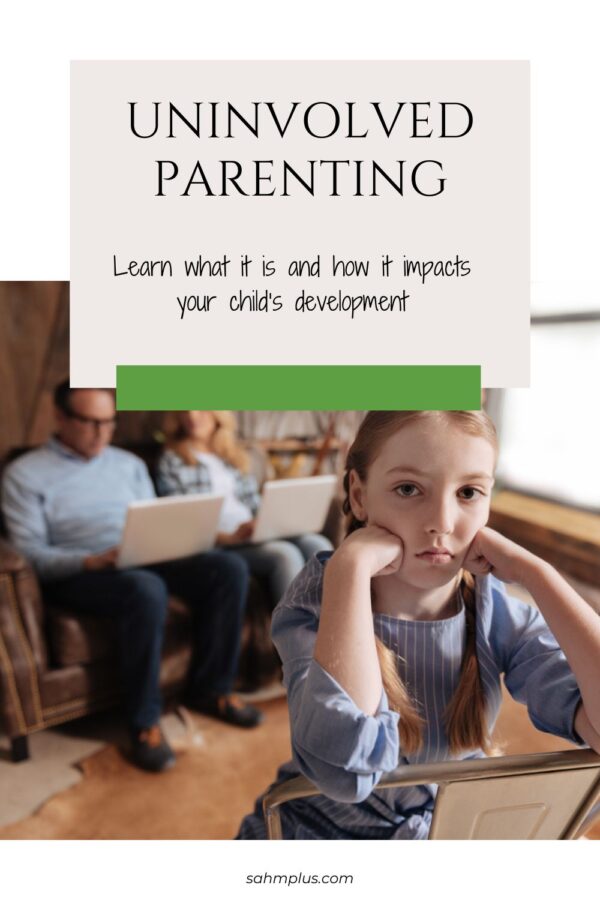Ever wondered what happens when parents take a backseat in their kids’ lives? Well, that’s where uninvolved parenting comes into play. Also known as neglectful parenting, it’s like the ultimate hands-off approach, where parents are more MIA than your favorite disappearing magic trick.
Learn what uninvolved parenting looks like, how it affects the kiddos, and what we can do to ensure they don’t miss out on all the good stuff. From the signs to the impacts and even some ways to turn the ship around, we’ve got you covered. So, buckle up as we explore the world of uninvolved parenting together!

What is Uninvolved Parenting?
Uninvolved parenting, also known as neglectful parenting, is a style of parenting characterized by a lack of emotional involvement and responsiveness towards the child’s needs. In this approach, parents tend to be detached and disengaged from their child’s life, providing minimal guidance, support, and attention.
Uninvolved parents often prioritize their own needs or are overwhelmed by external factors such as work or personal issues, leading to limited interactions with their children. They may neglect basic responsibilities like:
- providing adequate supervision
- ensuring proper nutrition and hygiene
- or attending to the child’s emotional well-being.
This parenting style can have significant negative effects on a child’s development.
Children who grow up with uninvolved parents may experience:
- feelings of abandonment
- low self-esteem
- difficulties forming healthy relationships
They may also exhibit behavioral problems and have difficulties in academic performance.
It is important to note that uninvolved parenting is distinct from other styles such as authoritative or permissive parenting. While authoritative parents are nurturing and set clear boundaries for their children, uninvolved parents lack interest or involvement in their children’s lives altogether.
Understanding the concept of uninvolved parenting helps us recognize the importance of parental engagement in shaping a child’s well-being. By promoting awareness about this style of parenting, we can encourage healthier approaches that prioritize the emotional needs and overall development of children.
Key Features of Uninvolved Parenting
Uninvolved parents tend to be unresponsive to their children’s needs and may prioritize their interests or responsibilities over their children’s well-being.
One key feature of uninvolved parenting is the lack of emotional support provided to children. Parents who practice this style often fail to provide the necessary love, affection, and guidance that children need for healthy emotional development. This can result in feelings of insecurity and low self-esteem in children.
Another characteristic is minimal supervision. Uninvolved parents may not closely monitor their children’s activities or whereabouts, leading to potential safety risks and a lack of boundaries. Without proper guidance and supervision, children may struggle with making responsible decisions or understanding appropriate behavior.
Furthermore, the absence of parental involvement is a defining aspect of uninvolved parenting. These parents may be disengaged from their child’s life, showing little interest in their education, hobbies, or social interactions. This lack of involvement can hinder a child’s overall development and leave them feeling neglected or unsupported.
It is important to note that uninvolved parenting should not be confused with intentional neglect or abuse. Often, these parents may have various personal challenges or circumstances that prevent them from being more actively involved in their child’s life.
Understanding the key features of uninvolved parenting allows us to recognize its impact on a child’s well-being and development. By promoting awareness and providing resources for support and education, we can strive towards creating healthier family dynamics that prioritize the needs and growth of our future generations.
Effects of Uninvolved Parenting on Children
When parents are neglectful or fail to provide the necessary attention and support, children may experience low self-esteem, struggle academically, exhibit behavioral issues, and face challenges forming healthy attachments.
One of the most significant consequences of uninvolved parenting is the negative impact it can have on a child’s self-esteem. When children do not receive consistent love and attention from their caregivers, they may internalize feelings of worthlessness or develop a distorted sense of self. This lack of validation and emotional support can hinder their confidence and make it difficult to navigate social interactions.
Furthermore, uninvolved parenting often leads to poor academic performance. Without parental involvement in education, children may lack the necessary guidance and motivation to excel academically. They may struggle with organization skills, time management, and a lack of encouragement that hinders their ability to reach their full potential.
Behavioral issues are also common among children who experience neglectful parenting. The absence of consistent boundaries and discipline can result in a lack of structure in a child’s life. This can lead to behavioral problems such as aggression, defiance, or withdrawal as they attempt to navigate the world without clear guidance.
Additionally, attachment difficulties are prevalent among children who grow up with uninvolved parents. Secure attachment is crucial for healthy emotional development; however, when caregivers are emotionally distant or unavailable, children may struggle to form secure attachments with others later in life. This can impact their ability to form healthy relationships and trust others.
Signs of Uninvolved Parenting
It is important to recognize the signs of uninvolved parenting to address and support these children appropriately. A few signs a child is being cared for by uninvolved parents include:
- Difficulty forming emotional connections: Children may struggle to build secure relationships and express emotions due to insufficient parental engagement and emotional support.
- Lack of guidance and boundaries: Children might exhibit behavioral issues and insecurity, potentially stemming from a lack of parental supervision and established boundaries.
- Low self-esteem: Signs of children feeling neglected and unimportant can arise from insufficient parental involvement and a lack of emotional validation.
- Academic challenges: Children’s struggles in school and a lack of motivation can be attributed to the absence of parental support and encouragement in educational pursuits.
Check out a couple of scenarios that highlight the consequences and challenges faced by children growing up under uninvolved parenting.
Scenario 1: The Absent Confidant
Imagine a young girl, Sarah, navigating the tumultuous waters of adolescence, grappling with the daunting challenges of identity formation and peer pressure. With uninvolved parents who are consistently absent emotionally and physically, Sarah finds herself adrift without a compass. Her need for guidance and emotional support remains unmet, leading to a sense of isolation and detachment. In the absence of open communication and trust, Sarah turns to her peers for advice, often adopting their values and beliefs, regardless of their impact on her well-being. As a consequence, her self-esteem wavers, and her decision-making becomes erratic, lacking the grounding that parental guidance could have provided.
Scenario 2: The Unseen Achiever
Now, let’s meet James, a bright young boy with a natural aptitude for academics. In his home, however, achievements are met with a shrug and a passing remark, devoid of genuine interest or acknowledgment from his uninvolved parents. As he excels academically, his parents remain oblivious to his accomplishments, failing to provide the necessary encouragement and motivation that could fuel his passion for learning. Consequently, James begins to question the significance of his achievements, leading to a diminishing sense of self-worth and an erosion of his intrinsic motivation to excel. With no one to celebrate his victories or guide him through challenges, he starts to doubt his abilities, hindering his potential for growth and success.
Through these scenarios, we witness the profound impact of uninvolved parenting on the emotional and cognitive development of children. The lack of emotional support, guidance, and recognition can create significant hurdles in their path towards a healthy and fulfilling future. As we explore the consequences, it becomes evident that the absence of parental involvement can not only hinder a child’s growth but also shape their perception of self-worth and their capacity to navigate life’s challenges. It underscores the critical role that parental engagement plays in fostering resilience, confidence, and a sense of security in a child’s life.
Uninvolved Parenting Pros and Cons
Uninvolved parenting, also known as neglectful parenting, can have both advantages and disadvantages. It is important to explore these pros and cons to gain a better understanding of the potential impact on children and their development.
Benefits of Uninvolved Parenting:
- Encourages independence and self-reliance: Children have the opportunity to develop problem-solving skills and decision-making abilities independently, fostering a sense of autonomy and self-sufficiency.
Disadvantages of Uninvolved Parenting:
- Relationship difficulties: Uninvolved parenting can lead to strained relationships or detachment between parent and child due to the lack of emotional support and guidance, potentially affecting the parent-child bond in the long run.
- Risk of mental health issues: The absence of nurturing care may contribute to feelings of abandonment, loneliness, and low self-esteem, potentially leading to various mental health challenges that could persist into adulthood if not addressed.
- Challenges in forming healthy attachments: Children raised by uninvolved parents might face difficulties forming secure emotional bonds, impacting their ability to trust others or establish meaningful relationships later in life.
While uninvolved parenting may promote independence in some cases, its disadvantages should not be ignored. Relationship difficulties, mental health issues, low self-confidence, and an inability to form healthy attachments are all potential consequences that need careful consideration when examining this style of parenting.
Overcoming the Effects of Uninvolved Parenting: Strategies for Parents and Caregivers
In today’s fast-paced world, many parents and caregivers find themselves struggling with the effects of uninvolved parenting. However, it is important to remember that there are strategies and resources available to help overcome these challenges.
One effective approach is seeking professional help. Consulting with therapists or counselors specializing in family dynamics can provide valuable insights and guidance on navigating the complexities of uninvolved parenting. These professionals can offer personalized strategies tailored to each family’s unique circumstances.
Improving communication with children is another crucial aspect of addressing the effects of uninvolved parenting. Actively listening to their thoughts and feelings, engaging in meaningful conversations, and creating a safe space for open dialogue can foster stronger connections between parents/caregivers and children. This can lead to a deeper understanding of each other’s needs and ultimately strengthen the parent-child relationship.
Setting boundaries and expectations is also vital in overcoming the effects of uninvolved parenting. Clearly defining rules, responsibilities, and consequences helps establish structure within the household. Consistency in enforcing these boundaries provides children with a sense of security and teaches them important life skills such as self-discipline and respect for others.
Additionally, providing emotional support and validation is essential for children who have experienced uninvolved parenting. Offering empathy, understanding, and reassurance helps build their self-esteem while fostering a sense of belonging within the family unit. By acknowledging their emotions and experiences, parents/caregivers can create an environment where children feel valued, heard, and loved.
Overcoming the effects of uninvolved parenting requires proactive steps from parents/caregivers. Seeking professional help, improving communication with children, setting boundaries and expectations, as well as providing emotional support are all key strategies that can make a positive difference in nurturing healthy relationships within families.
The Importance of Building a Supportive Network for Parents Dealing with Uninvolved Parenting Patterns
In today’s fast-paced world, parenting can often become a challenging journey. For parents dealing with uninvolved parenting patterns, the importance of building a supportive network cannot be overstated.
Parenting is a demanding responsibility that requires emotional support, guidance, and understanding. When faced with uninvolved parenting patterns, it can be even more overwhelming for parents to navigate through this complex situation alone.
A supportive network plays a crucial role in providing the necessary emotional and practical support to parents. It creates a safe space where they can share their experiences, seek advice, and find solace in knowing that they are not alone in their struggles.
By connecting with other parents who have faced similar challenges or professionals who specialize in parenting support, individuals can gain valuable insights and coping strategies. This network offers an opportunity for growth and learning as parents exchange ideas on how to effectively address uninvolved parenting patterns.
Furthermore, a supportive network helps alleviate feelings of isolation and provides validation for parents’ experiences. It reminds them that their concerns are valid and that others understand what they are going through.
Breaking the Cycle – Nurturing Healthy Relationships between Parents and Children
It is evident that breaking the cycle of negative patterns is crucial for fostering positive connections. Prioritizing open communication, empathy, and understanding can create a safe and supportive environment for their children to thrive.
It is important to recognize that building healthy relationships takes time and effort. Parents should be willing to reflect on their behaviors and make necessary changes to model positive interactions for their children. By setting clear boundaries, practicing active listening, and providing emotional support, parents can cultivate trust and mutual respect within the parent-child relationship.
Furthermore, seeking professional guidance through therapy or counseling can be immensely beneficial in addressing any underlying issues or challenges that may hinder the development of a healthy parent-child bond. These resources offer valuable insights and strategies tailored to individual circumstances.
Breaking the cycle of negative patterns in parent-child relationships requires dedication, self-reflection, and a commitment to growth. By fostering an authoritative parenting style with open lines of communication, empathy, and understanding, parents can create an environment where love flourishes and healthy connections thrive. Remember that every effort made towards nurturing these relationships will have a lasting impact on both the parent’s well-being as well as the child’s overall development.
Articles In Our Parenting Styles Series
- 4 Parenting Styles & What They Mean for Your Family
- Why Are Parenting Styles Important?
- How to Agree on Parenting Styles When Your Differences Hurt Your Marriage
- The More Children You Have, The More Your Parenting Style Changes
- Top Tips to Help You Change Your Parenting Style

FAQs About Uninvolved Parenting
Why do some parents adopt uninvolved parenting?
Parents might adopt an uninvolved approach due to various reasons such as personal challenges, work-related pressures, or emotional struggles, which can impede their ability to engage actively in their children’s lives.
What are the long-term effects of uninvolved parenting on children?
Uninvolved parenting can lead to long-term impacts on children, including potential issues with self-esteem, emotional attachment difficulties, behavioral challenges, and struggles in forming healthy relationships later in life.
How can family dynamics contribute to uninvolved parenting?
Family dynamics, such as high levels of stress, lack of emotional support, or poor communication patterns, can contribute to uninvolved parenting. Additionally, unresolved personal issues or intergenerational patterns of neglect within families can also play a role in this parenting style.
